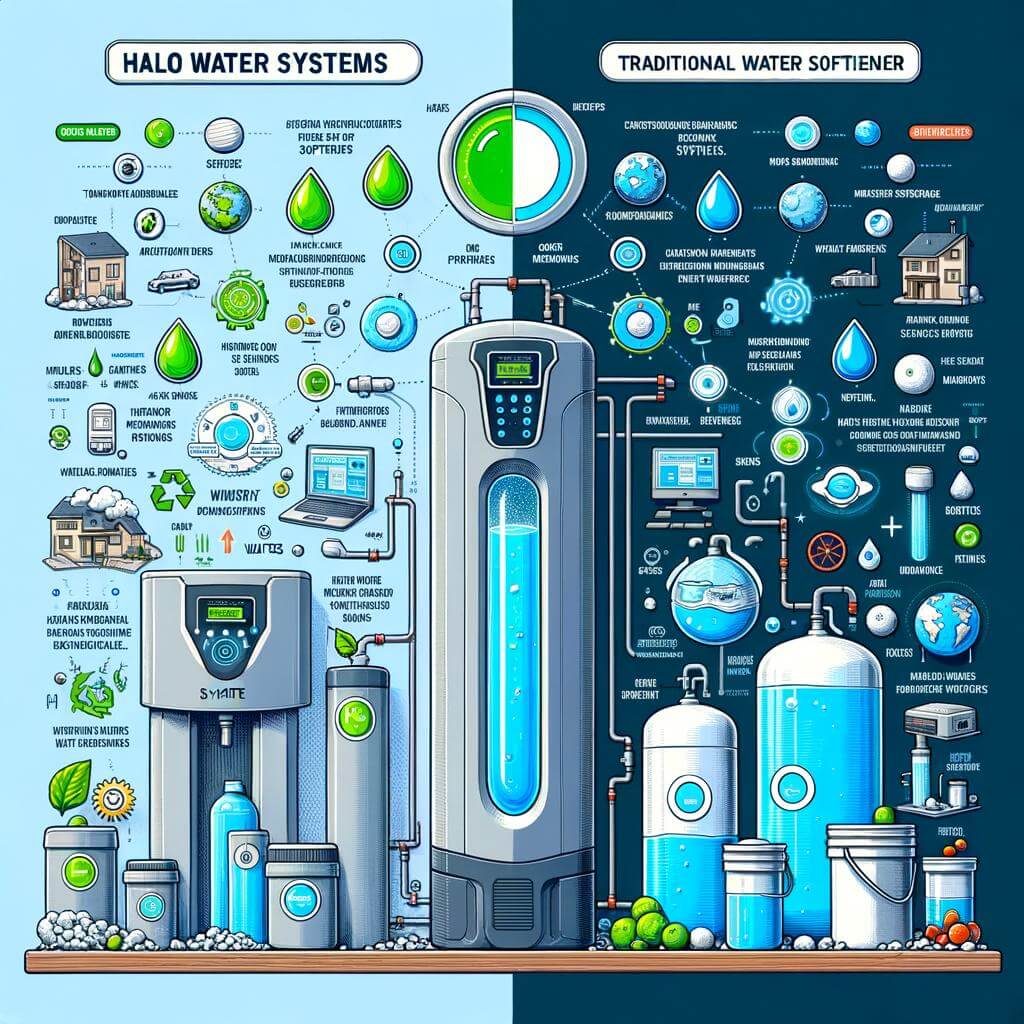Welcome to our post on “Understanding the Halo Water System vs. Traditional Softeners”! This educational resource provides an expert comparison of these two popular water treatment solutions. We’ve compiled a treasure trove of facts to help you gain a deeper understanding of their features, benefits, and potential drawbacks. By reading this post, you’ll learn which system might be better suited for your home or business needs, ensuring you make an informed decision. Say hello to more efficient water usage and healthier water consumption habits. Let’s dive into the deep end of knowledge!
Understanding Halo Water Systems
When it comes to water quality, the battle is often between traditional water softeners and modern systems like the Halo Water System. Traditional softeners primarily function to reduce hard water problems by replacing calcium and magnesium ions in the water with sodium ions. They require salt as an essential component to effectively soften water. However, the elevated sodium levels can pose health risks for individuals with high blood pressure or dietary sodium restrictions.
In contrast, Halo Water Systems aim to provide a comprehensive solution for water treatment. These systems don’t just address hard water issues, but also aim to purify and filtrate your water:
- Halo ION – This inline water conditioner prevents scale build-up without adding extra sodium into your water.
- Halo 5 – This system is a multi-stage water treatment appliance that uses both carbon and high-grade mixed media to ensure clean and soft water throughout your whole house.
- Halo UV – This system uses an ultraviolet lamp to neutralize bacteria and other microorganisms in your water supply.
| Water Systems | Benefits |
|---|---|
| Traditional Softeners | Reduces hard water |
| Halo ION | Prevents scale build-up, no added sodium |
| Halo 5 | Clean and soft water throughout the house |
| Halo UV | Neutralizes bacteria and microorganisms |
Understanding the different aspects of these systems can help you make an informed decision based on your water quality needs and health concerns. Remember, the quality of your water affects not only your household appliances but more importantly, your and your family’s health.

The Working Mechanism of Halo Water Systems
The Halo Water System is a state-of-the-art water treatment solution that not only softens but also purifies water. This innovative technology incorporates several steps into its mechanism: First, it filters larger particles through its pre-filter, capturing sediment and debris. Next, the water passes through a granular activated carbon filter, which traps a wide range of contaminants, from chemicals to microbial contaminants. Hereafter, the Ion Trap softens hard water by replacing calcium and magnesium particles with sodium ions. Lastly, the Guardian R.O. provides the final filtration stage, removing any remaining impurities and providing ultra-clean water.
Comparatively, traditional softeners employ only one single step – a process known as ion exchange. Here, hard water flows through a mineral tank filled with resins that attract and bind the hard minerals, simultaneously releasing softer minerals into the water. While this does manage to soften the water, it simultaneously increases its salinity and, unfortunately, does not necessarily treat other contaminants. In conclusion, Halo Water Systems provide a more holistic solution to water treatment, tackling a variety of problems that traditional softeners don’t.
| Halo Water Systems | Traditional Softeners |
|---|---|
| Filtration | Softening |
| Pre-filter | – |
| Granular Activated Carbon | – |
| Ion Trap | Ion Exchange Resin |
| Guardian R.O. | – |

Comparison Between Halo Water System and Traditional Softeners
In the realm of water treatment, two prominent solutions are widely accepted: The Halo Water System and Traditional Softeners. While the underlying goal for both remains the same – providing pure, clean, and soft water – their mechanisms and efficiency vary notably.
| Halo Water System | Traditional Softeners |
|---|---|
| The Halo water system uses multi-stage filtration to purify water, bringing in a holistic approach. | Traditional softeners primarily focus on eliminating hard minerals, such as calcium and magnesium, from water. |
| It ensures balanced pH, removes contaminants, and reduces the hardness of water. | They use a process called ion-exchange to replace these hard minerals with sodium ions, effectively ‘softening’ the water. |
| Halo Water System doesn’t require a regular addition of salts, thus making it environmentally friendly. | Traditional softeners require regular salt replenishment, leading to increased sodium content in water & environmental concerns. |
Modern homeowners are increasingly gravitating toward the Halo Water System due to its all-inclusive method of water filtration and softening. Apart from maintaining water softness and pH balance, it safeguards you and your family from harmful contaminants such as lead, chlorine, and chemicals. The result is pure, refreshingly clean drinking water that contributes positively to your health. Furthermore, its zero-dependence on salt not only saves you from the hassle of regular replenishment but also fosters an eco-friendly approach to water treatment. In contrast, Traditional Softeners concentrate more on battling the hardness of water. While they are effective in eliminating hard minerals like calcium and magnesium, the ion-exchange process introduces increased sodium content into your water. The side effect of this is potential health issues, especially for those on a low-sodium diet. Furthermore, the frequent requirement of salt replacement adds to maintenance efforts and raises environmental concerns owing to salt waste. Therefore, while effective in their primary function, they lack the all-round protection offered by the Halo system.
Benefits of Choosing Halo Water Systems over Traditional Softeners
The Halo Water Systems present numerous advantages over traditional softeners that make them an ideal choice for your home. Firstly, Halo systems provide more than just softening. They are comprehensive, whole-house water treatment systems delivering clean, safe, and even great tasting water right to your taps. Traditional softeners, on the other hand, primarily focus on reducing the hardness of water with limited functions in water filtration or contaminant removal.
| Halo Water Systems | Traditional Softeners |
|---|---|
| Complete water treatment | Limited to softening |
| High efficiency | Can waste salt and water |
| Protects plumbing and appliances | Less protective |
| Environmentally-friendly | May contribute to salt pollution |
Another significant benefit of choosing Halo Water Systems over traditional softeners is that they are extremely efficient. They use significantly less water and salt during their regeneration process, making them the perfect choice for environmentally-conscious homeowners. This not only reduces your water and salt consumption but also leads to cost-saving in the long run. Furthermore, their advanced technology ensures that your plumbing and water-using appliances are protected against the corrosive effects of hard water, adding further value to your investment.
In contrast, traditional softeners can be wasteful, using a high amount of salt and water during regeneration, which can contribute to salt pollution. Moreover, they often leave traces of hardness in water, which can still adversely affect your home’s plumbing and appliances. The limited protection they offer against the harsh effects of hard water can make them less cost-effective in comparison.
- Halo systems deliver superior performance that goes beyond just softening.
- The high efficiency of Halo systems results in significant savings and less environmental impact over time.
- Traditional softeners often fall short in areas that Halo systems excel at, like comprehensive water treatment and protection of home appliances.

Detailed Insights into the Maintenance of Halo Water Systems
When it comes to water treatment, the Halo Water System stands out from the crowd. Unlike traditional softeners, which mostly replace hard minerals like calcium and magnesium with sodium or potassium ions, the Halo Water System utilizes a multi-stage process to condition, filter, and refine the water. This innovative approach ensures softer, healthier water, both for your consumption and for household use.
In addition to their salt-free conditioning process, Halo systems use high-density carbon filtration for further refinement. They assimilate GAC (Granular Activated Carbon), Centaur High Activity Carbon (HAC), and KDF Process Media in different stages of their filtration process. Here’s what makes each type of filtration media effective:
- GAC: This media excels at reducing unpleasant tastes and odors from water.
- HAC: Enhances the removal of chlorine and chloramines, besides various organic contaminants.
- KDF: Proven to greatly eliminate heavy metals and control the growth of microorganisms.
| Filtration Media | Function |
|---|---|
| Granulated Activated Carbon (GAC) | Reduces unpleasant tastes and odors |
| Centaur High Activity Carbon (HAC) | Removes chlorine, chloramines, and various organic contaminants |
| KDF Process Media | Eliminates heavy metals and controls microorganism growth |
Furthermore, the Halo Water System believes in excluding salt entirely from the process, alleviating concerns of consuming high-sodium water that traditional softeners carry. The system’s efficiency, eco-friendliness, and ability to maintain soft, healthy water without the need for salt, membrane replacements, or electricity sets it apart from traditional systems. It’s a revolution in the water treatment industry, providing a solution that is both user-friendly and more sustainable for the environment.

Expert Recommendations for Optimal Use of Halo Water Systems
Though both traditional water softeners and Halo Water Systems have their own unique advantages, we, as water treatment experts, often lean towards recommending the later for several reasons. Longevity, efficiency, and environmental impact are three key areas where Halo stands out.
Firstly, Halo Water Systems are known to significantly outlast traditional softeners, often lasting for years without requiring expensive repairs or replacements. Coupled with lower ongoing maintenance costs, your investment in a Halo system tends to go a lot further. Secondly, the innovative design of Halo systems endows them with an unbeatable efficiency rate. They soften every single drop of your water without any wastage whatsoever, ensuring your household always has ample softened water for all uses.
- Longevity: Traditional softeners often require frequent maintenance and may need to be replaced every few years. On the other hand, a Halo system can last for decades with minimal upkeep.
- Efficiency: Unlike traditional softeners that can waste water during the softening process, Halo systems are designed to treat all water with maximum efficiency and zero wastage.
- Environmental Impact: Halo systems have a much smaller environmental footprint as they do not use salt, thus avoiding excessive sodium discharge into our waterways – a common environmental concern associated with traditional softeners.
| Factors | Traditional Softeners | Halo Water System |
|---|---|---|
| Longevity | A Few Years | Decades |
| Efficiency | Variable Efficiency | Max Efficiency |
| Environmental Impact | High (due to salt usage) | Low (salt-free technology) |
In conclusion, while both traditional softeners and Halo systems provide the much-needed benefit of water softening, when it comes to efficiency, longevity, and eco-friendliness, Halo Water Systems decidedly have the upper hand.
To Conclude
In conclusion, understanding the differences between the Halo Water system and traditional water softeners is essential for anyone seeking to manage and improve their water quality. Both systems have their own set of advantages and offer unique features. While traditional softeners have been around for a long time and have proven to be effective, the Halo Water system offers comprehensive water treatment with the added benefit of a green, maintenance-free approach. Remember, choosing the right system for your home depends on your water needs, the ease and cost of maintenance you desire, and your commitment to environmental sustainability. It is advised to do thorough research or seek expert opinion before making a decision. We hope this article has provided you with valuable information to make an informed choice for your home.




